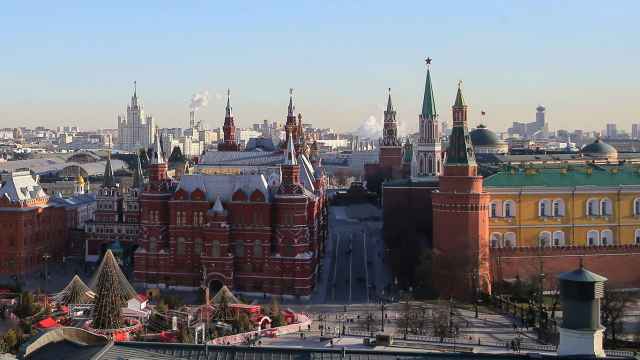Resisting the advice of two jailed former Yukos executives, whistleblower Alexei Navalny said in comments published Monday that he would not leave the country to avoid criminal prosecution.
Navalny The New Times magazine that the fraud case against him was fabricated by officials afraid of his anti-corruption exposes, and leaving would allow them to succeed in their attempt to silence him.
"If I leave, everything will come crashing down. So I won't do that ever," Navalny said.
The Investigative Committee last week reopened a fraud case for a second time against Navalny, accusing him of using illegal "corporate raiding" tactics to press a state company into a disadvantageous contract in 2009, when he worked as an unpaid adviser to Kirov Governor Nikita Belykh.
Former Yukos CEO Mikhail Khodorkovsky last week that Navalny should consider going into exile to avoid prosecution.
"If it would be in the best interests of his campaign and his safety, no one would blame him for temporarily leaving the country," Khodorkovsky said through his lawyer, Novaya Gazeta reported Saturday.
Khodorkovsky's jailed partner Platon Lebedev said "There's no chance to score serious anti-corruption successes from pretrial detention."
Meanwhile, Federation Council Speaker Sergei Mironov proposed legislative protection for whistleblowers like Navalny, taking a new step toward political opposition.
Mironov did not mention Navalny by name, only that state protection should be extended to the likes of a "well-known online project where citizens analyze government purchases, often identifying outrageous and, most likely, lucrative embezzlement [cases]," Interfax reported.
The statement is an unequivocal reference to Navalny's web site Rospil.info, which monitors state tenders for corrupt practices. Confidential personal data on web site donors, earlier collected for unexplained purposes by the Federal Security Service, has been leaked to third parties. Navalny has accused the FSB of giving the information to Nashi, the pro-Kremlin youth movement.
Mironov did not elaborate on the proposed legislation.
Neither Navalny nor his spokesman were available for comment Monday afternoon.
A Message from The Moscow Times:
Dear readers,
We are facing unprecedented challenges. Russia's Prosecutor General's Office has designated The Moscow Times as an "undesirable" organization, criminalizing our work and putting our staff at risk of prosecution. This follows our earlier unjust labeling as a "foreign agent."
These actions are direct attempts to silence independent journalism in Russia. The authorities claim our work "discredits the decisions of the Russian leadership." We see things differently: we strive to provide accurate, unbiased reporting on Russia.
We, the journalists of The Moscow Times, refuse to be silenced. But to continue our work, we need your help.
Your support, no matter how small, makes a world of difference. If you can, please support us monthly starting from just $2. It's quick to set up, and every contribution makes a significant impact.
By supporting The Moscow Times, you're defending open, independent journalism in the face of repression. Thank you for standing with us.
Remind me later.





